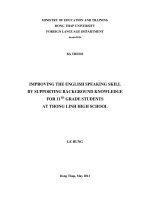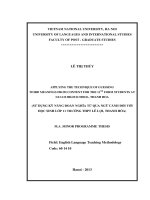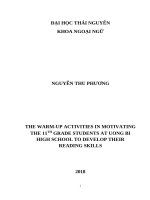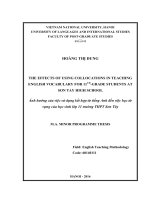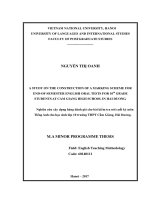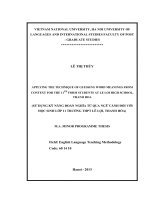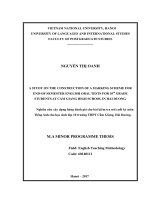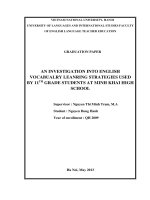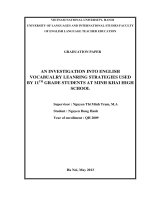b.a thesis improving the english speaking skill by supporting background knowledge for 11th grade students at thong linh high school
Bạn đang xem bản rút gọn của tài liệu. Xem và tải ngay bản đầy đủ của tài liệu tại đây (638.22 KB, 69 trang )
MINISTRY OF EDUCATION AND TRAINING
DONG THAP UNIVERSITY
FOREIGN LANGUAGE DEPARTMENT
BA THESIS
IMPROVING THE ENGLISH SPEAKING SKILL
BY SUPPORTING BACKGROUND KNOWLEDGE
FOR 11
TH
GRADE STUDENTS
AT THONG LINH HIGH SCHOOL
LE HUNG
Dong Thap, May 2013
MINISTRY OF EDUCATION AND TRAINING
DONG THAP UNIVERSITY
FOREIGN LANGUAGE DEPARTMENT
BA THESIS
IMPROVING THE ENGLISH SPEAKING SKILL
BY SUPPORTING BACKGROUND KNOWLEDGE
FOR 11
TH
GRADE STUDENTS
AT THONG LINH HIGH SCHOOL
LE HUNG
SUPERVISOR: TRAN THI HIEN, MA
Dong Thap, May 2013
i
DECLARATION
I, hereby, declare that my thesis entitled: “Improving the English speaking skill by
supporting background knowledge for 11
th
grade student at Thong Linh High School” is
the result of my own work, submitted in the fulfillment for the requirements of the B.A
degree. Except where the reference is indicated, no other person’s work has been used
without due acknowledgement in the text of the thesis.
Cao Lanh City, May 2013.
Le Hung
ii
ACKNOWLEDGEMENTS
I would like to express my deepest gratitude to my supervisor, M.A Tran Thi Hien, for
her enthusiastic and helpful guidance, insightful comments and encouragement without
which my thesis would not have been completed.
My special thanks to all my lectures in Foreign Language Faculty, Dong Thap University
for their precious assistance, knowledge and enthusiasm.
I am also grateful to all the participants, students of 11CB1 class at Thong Linh High
School for their enthusiastic participation and cooperation during the duration of
conducting the research.
Especially, I am thankful to my classmate as well as my colleague in the research, Doan
Thi Tra My, for her great support and assistance.
Last, I would like to express my profound gratitude to my family, especially my parents,
who have given me constant support, both spiritual and material, and love during the
completion of the thesis.
Le Hung
iii
ABSTRACT
This study, which focused on English speaking skill of 11
th
grade’s students at Thong
Linh High school, was conducted in the hope of finding out the relationship between
background knowledge and English speaking skill. Data used for analysis in this study
mainly collected through observations, surveys using questionnaire and interview during
the time of experimenting an proposed method. By means of analysis both qualitative and
quantitative collected data, it was concluded that between background knowledge and
speaking skill, there was an existing relationship. One of the significant results from data
analysis was that building up awareness via supporting background knowledge related to
topics of speaking lesson to English-learning students before letting them going to talk
was an effective approach to improve English speaking skill.
iv
TABLE OF CONTENTS
DECLARATION i
ACKNOWLEDGEMENTS ii
ABTRACT iii
TABLE OF CONTENTS iv
LIST OF TABLES, FIGURES AND NOTATIONAL CONVENTIONS vii
CHAPTER 1: INTRODUCTIONS 1
1.1. Motivation for the study 1
1.2. Aims of the study 3
1.3. Research question 3
1.4. Scope of the study 4
1.5. Research method 4
1.6. Significance of the study 4
1.7. Previous related studies 5
1.8. Organization of the study 5
CHAPTER 2: LITERATURE REVIEW 7
2.1. Speaking skill and its important role in English learning 7
2.1.1. Definitions of speaking and speaking skill 7
2.1.2. The important role of Speaking in English learning 8
2.2. Background knowledge 11
2.2.1. Definition of background knowledge 11
v
2.2.2. The significance of background knowledge in learning and
accomplishing a non-native language 13
CHAPTER 3: METHODOLOGY 16
3.1. Research question 16
3.2. Research setting and participants 16
3.2.1. The setting 16
3.2.2. The research participants 17
3.3. Data collection instruments 20
3.3.1. The observation instrument 20
3.3.2. The survey questionnaires instrument 23
3.3.3. The interviews instrument 24
3.3.4. Validity and reliability of measure instruments 25
3.4. Data collection procedure 26
3.4.1. Procedure of the observations 26
3.4.2. Procedure of the survey questionnaires 30
3.4.3. Procedure of the interviews 31
3.5. Data analysis method 32
CHAPTER 4: THE RESULTS AND DISCUSSION 34
4.1. An overview of the results 34
4.1.1. The observations’ results 34
4.1.2. The survey questionnaires’ results 38
4.1.3. The interviews’ results 42
4.2. Discussion 44
vi
CHAPTER 5: CONCLUSION 49
5.1. Summary of the research and implications on teaching 49
5.1.1. Summary of the research 49
5.1.2. Implications on teaching 50
5.2. Limitation of the study and suggestions for further studies 51
5.2.1. Limitations of the study 51
5.2.2. Suggestions for further studies 51
REFERENCES
APPENDICES
Appendix 1: The observation checklist
Appendix 2: Supporting materials using in the experiment
Appendix 3: Questionnaire No.1
Appendix 4: Questionnaire No.2
vii
LIST OF TABLES, FIGURES AND NOTATIONAL CONVENTIONS
Table 1: Rubrics of grading speaking skill 21
Table 2: The overview results of the Observation 35
Table 3: The overview results of the survey using Questionnaire No.1 38
Table 4: The overview results of the survey using Questionnaire No.2 41
Figure 1: A proposed process of supporting & speaking skill’s development 22
Figure 2: A Column chart expressing the changes on English speaking ability’s scores
through the experiment 37
Italics type is used for terms, illustrations, explanations and emphasis.
1
Chapter 1
Introduction
1.1. Motivation for the study
English is the most popular language in the world. English has become the world’s
most used and most common language (Nikolov, 2009, p. 404). Approximately more
than 600 million people around the world currently speak English, and that number is
rapidly growing. More people speak English as a second or foreign language than
“monolingual English”, native speaker. Many countries, including Vietnam, set up the
compulsory study of English as a foreign language from primary school in their
educational system, and many parents are aware that the more knowledge of English, the
better jobs in the future their children will get. Countries are keen on improving their
citizens’ English skills so as to ensure entry into the global market. In short, these days
English is a language of worldwide influence and importance.
On the other hand, in learning English, “the ability to speak is considered as passport to
success” (Spoken English, 2009, p. 5). Because speaking skill is the one can satisfy the
principal function of a language, serving for communication; therefore, a person who can
speak English well will certainly find it is easy to master English learning in general.
Unfortunately, to those who study English as a non-native language, speaking is
regarded as the most difficult one among four main communicative skills of English.
Many English learners in Vietnam also realized that it is so much difficult to speak
English fluently and automatically in classroom. To improve ability, we had better look
at carefully about our weakness and anticipate probable results for proposing suitable
approaches. Consequently, through some interview and questionnaire surveys as well as
2
observations in the reality of teaching and learning English at high school, weak points of
English speaking ability of Vietnamese students have partly pointed out; these problems
are mostly related fluency, automatic response and the relevance content to the topic that
is talking about.
First, Rizvi (2005) asserts, “fluency is the most important characteristic of effective
speech” (p. 97). Undeniably, it means a fluent oral presentation can easily catch and
retain the attention of audiences. Yet, Vietnamese students’ speech cannot be as fluently
as it should to be, especially when they faced to unfamiliar speaking topics. There are
many unexpected noticeable pauses and repetitions because of forgetting about words or
ideas. It seems to be they are not actually confident on the content of their speeches.
Furthermore, it leads to another problem in their speaking ability, relevance content.
Actually, they also tend to speak about something that is either partly or completely
unrelated to the topic although at the beginning of speech, they always point their
opinions out in a clear way. The reason why is that between three main parts of a typical
presentation; opening, body and conclusion, a link connected main idea does not exist
and supporting details do not well organized. It causes not only unconnected sentences on
speech but also such unexpected negative feelings on listeners as bored and confused.
Second, accordingly, “speaking is a process in which thought and its articulation are
almost simultaneous” (Spoken English, 2009, p. 8). It is not like writing where there is
much gap of time for contemplation and connection between thought and expression.
Speaking must be spontaneous to be effective. However, in the interaction with English
lecturers in class, English learners usually cannot automatically respond to, for example,
teacher’s questions or communications. For the reason that they have to spend much time
on thinking ideas in Vietnamese and translating them into English before speaking out.
As a result, the duration for interactions is extended in an unanticipated way meanwhile
time for other speaking activities is shortened. In short, such this inherent habit is really a
barrier, which prevents them from practicing the most useful skill, speaking, and entirely
participating in other speaking activities in class.
3
For all these reasons, how English-learning students can improve their English speaking
skill to satisfy the essential requirements of speaking: fluency, relevance content and
automatic response in the interactions is an interesting and complicated question.
Accidentally, many Vietnamese high school students admitted that sometimes when
participating in speaking activities in class, they realized their speaking presentations
about such unfamiliar topics as science, philosophy, history, etc. were worse than the
ones about their favorite areas related to sport, travel or health. As a result, a question has
raised “Is there any relationship between background knowledge and English speaking
skill”.
This idea about an undiscovered relationship may need to be verified in the reality, but
its frequency, according to students’ English learning experiences below, somewhat give
us a reliable foundation. They shared that whenever their teacher of English states an
issue or question, which they have already found it out, probably in newspaper or on the
Internet, they were willing to stand up and expressed their own ideas in a confident way
with a loud voice and fluency. In such cases, their speeches flowed smoothly while main
ideas and supporting ones were organized logically. With the information (knowledge)
collected mostly from online articles or books, they had a plentiful supply of ideas for
selection the most appropriate ones to state out in their presentations. Once oral
performance was well-organized like that, it was not surprised that everything went on as
well as they expected. As a matter of fact, it strongly support a belief that between
speaking skill and background knowledge, there is an existent relationship.
1.2. Aims of the study
The main purpose of the research is finding out the relationship between background
knowledge and students’ English speaking skill through experimental process. Also, it is
intended to provide some reliable implication for teaching English speaking skill at high
school in Dong Thap Province.
1.3. Research question
4
With the aim as mentioned earlier, the research question was addressed as following
and this thesis was hoped to answer it:
Is there any relationship between background knowledge and English speaking skill?
1.4. Scope of the study
The focused area of this research is finding out the relationship between background
knowledge and English speaking skill of students in grade 11
th
at Thong Linh High
School, Cao Lanh District, and considering whether background knowledge contributes
to English speaking ability or not. In addition, among various factors building up English
speaking skill, this research mentions the only one, background knowledge, in
improvement English speaking skill.
1.5. Research method
The most principal method being used in this thesis was qualitative study, in which
there was an experiment applied in participants’ English speaking class to measure any
development in their English speaking skill, then to find out the answer for the research
question, whether or not there is any relationship between background knowledge and
English speaking skill. The study also involved the quantitative study to collect critical
statistics for discussion about aspects of the research question. The quantitative study
utilized a survey by using a measurement instrument, questionnaires, to collect essential
information about participant’s knowledge and their attitude toward their English
learning in general and English speaking skill in particular. The qualitative study utilized
observations, in which participants’ English speaking ability, before and after the
research’s treatment implemented, was measure based on the observation checklist. It
also consisted of another instrument, interviews, to collect participants’ feedbacks after
the implementing of research’s approach. The data collected through either qualitative or
quantitative instruments were analyzed to serve for the purposes of considerations,
interpretations, and conclusions in the thesis, based on data analysis.
1.6. Significance of the study
5
The study deals with proving the relationship between background knowledge and
English speaking skill. As mentioned earlier, speaking skill is really considered as the
most complicated one, among four skills of English, to be learnt and many difficulties are
rising in the learning procedure of speaking lesson. The study carried out with the hope to
provide reliable evidence that background knowledge can be an essential element in the
progression of students’ English speaking ability. In addition, once the proposed
relationship proven to be right after the experiment, the study’s findings also hope to
make contributions to possible English teaching methods’ improvement at high school in
Dong Thap Province.
1.7. Previous related study
The thesis that mentions and make a research about the relationship between background
knowledge and speaking skill have not been done before at Dong Thap University.
1.8 . Organization of the study
The thesis consists of five chapters:
Chapter 1: Introductions, this part presents the overview of the thesis including
motivation, aims, scope, research methods, previous related studies as well as the
organization of the study.
Chapter 2: Literature Review, this chapter provides the theoretical background including
speaking skill and its important role in English learning as well as background knowledge
Chapter 3: Methodology, this chapter focuses on presenting research questions, research
setting and participants, research procedure, data collection, as well as methods of
analysis.
Chapter 4: The Results and Discussion, this chapter presents the results gained in survey
using questionnaires, interviews; and objective observations. Then, these results will be
discussed to conclude major findings as well as to finally answer for the research
question about the relationship between background knowledge and English speaking
skill.
6
Chapter 5: Conclusions, this part summaries the major findings recorded during the
making of the thesis, presents the limitations of the study, and provides some suggestions
for further research.
7
Chapter 2
Literature Review
2.1. Speaking skill and its important role in English learning
2.1.1. Definitions of speaking and speaking skill
Florez (1999) defines speaking is “an interactive process of constructing meaning that
involves producing and receiving and processing information” (p.1) in her book. Indeed,
in this complicated process, speaking’s form and meaning are dependent on the context in
which it occurs, including the participants themselves, their collective experiences, the
physical environment, and the purposes for speaking. It is often spontaneous, open-
ended, and evolving. This is an explanation in a scientific and academic way, somehow
very difficult to comprehend. Thus, below is another way of clarification that may help
you find easily in understanding what speaking really is.
In human’s life, speaking ranks the third on human’s most activities on a day, just after
breathing and sleeping. We have spent most of our daytime to speak for the purpose of
communication, informational exchange and emotional expression. Dr. Brizendine
(2009), a clinical professor of psychiatry at the University of California, San Francisco
states that “A woman uses about 20,000 words per day while a man uses about 7,000” (p.
45). The purpose of citing these two numbers does not just compare that a female speak
nearly three times more than a male, but helps us to realize how much we speak in a day
and how much time we spent on speaking throughout our lifetime.
From the definition of speaking, we can generalize that speaking skill is a linguistic
term that denotes human beings’ ability to express their own thoughts and feelings. And
because of a close relationship with people’ daily activities, speaking is also considered
as an easy-to-acquire skill. In fact, this idea is not accurate at all. Levelt (1993) considers
8
speaking as “one of our most complex cognitive, linguistic and motor skills” (p. xiii). In
other word, speaking is a complicated skill because of its somehow strong association
with speaker’s knowledge, awareness or experience. Indeed, people usually speak or
response quickly to something they are familiar with. That is the reason why in most of
conversation, when both speaker and listener have no thing to continue talking, they will
turn their conversation into what so-called “small talk”. This term means exchanging or
talking about such trivial but common topics as weather, climate, hobby, etc. These
topics are so close that everyone can talk or share something to keep their conversation
going on and becoming warmer. From this point of views, it is no doubt that speaking
skill, just like any natural phenomenon in our world, always exists in the relationship
with the others, and one of them is knowledge, personal knowledge of those who
participate in speaking activities. And this relation is the main answer that this thesis
wanted to seek.
2.1.2. The important role of speaking in learning English
Among the four language skills mentioned above, speaking has a great influence on
other skills in particular and the process of learning English in general. To have a more
specific understanding of this view, it is quite necessary to regard speaking in the
relationship with the three others.
Brilhart (1965) considers “the relationship between speaking and hearing has been
extended to the assumption that speaking and listening skills are positively correlated”
(pp. 35-46). However, the real nature of this pair skill is not completely resemblance
despite their mutual supportive relation. While listening is an existing skill, an innate
ability to hear sounds from the environment, speaking is an acquired or learned skill,
which is possessed through a sequence of studying. If we observe the child’s language-
learning process, this fact becomes obvious. Listening is used to create and develop
speaking skill and vice versa, speaking is an outer express of reaction to being heard
sounds. By listening day by day and imitating strange sounds from his parents or other
family’s members, a child have set first steps on the process of producing his own words.
9
Gradually, going along with the brain’s development, a 12-month-old-child can recognize
and understand these sounds in associating them with surrounding things or phenomena.
He at that time is able to articulate words that can be realized by adults and later, making
simple sentences at the age of two. Later, when a child has chances to interact with
strange environments beyond his home, especially when going to school; and new
phenomena involving in the society, the two other skills, reading and writing, are set up
and reinforced.
This whole process not only denotes a remarkable accomplishment in human
development, but also shows a persuasive evidence that we can learn speaking much
sooner than such other skills as reading and writing. Because speaking is the first learned
communicative skill in life, it surely contribute to developmental procedure of as a
principal element
Unfortunately, the order of possessing is almost exactly for all children, but in learning
the first language. In this case, when we mention English as a foreign language, is it still
right? To answer this question, let’s remind that language is primarily speech. This means
that language is primarily learnt by listening and speaking. Speaking comes after
listening, but before reading and writing. The child learns his mother tongue in this way.
He can also learn English by speaking in the language first before he can read and write
in the language. Speaking, therefore, occupies the most important place in English
language learning.
Now, after considering the vital position of speaking in the relationship with other
language skills, we should look at some important issues, which surround learning to
speak English as a foreign language to realize why speaking is important.
In both teaching and learning process of English in countries in which English is not the
mother tongue, many teachers have to teach mainly grammar and vocabulary because
these areas are tested in examinations. This means that speaking is a neglected language
skill in many classrooms. Students may have a good knowledge of grammar and a wide
10
vocabulary: they can use this knowledge to pass examinations, but they find it more
difficult to speak English outside the classroom.
So why is it important for teachers to learn to teach speaking, and for students to learn
to speak English?
More and more educators, scholarships, governments, ministries of education and
employers need people who can speak English well. Companies and organizations want
staff who can speak English in order to communicate within the international
marketplace. And going along with the rapid development of such international
certificates of English as TOEFL, IELTS, TOEIC, etc., an evaluation of learning English,
instead of testing comprehension or understanding about English, students are required to
prove their ability to use the language for communication in learning and living
environment, thus speaking now is one main part involving in these examinations. For
these reasons, students who can speak English well may have a great chance of further
education, of finding employment and gaining promotion.
In a more specific scale, there are also very good educational reasons to practice and
develop speaking during a lesson. Speaking activities can reinforce the learning of new
vocabulary, grammar or functional language. They also give students a chance to use the
new language they are learning. In addition, advanced students, through activities in
speaking lesson, can find opportunities to experiment with the language they already
know in different situations and on different topics. Furthermore, speaking English well
also helps students to access up-to-date information written and spoken universally in
English in numerous fields including science, technology, sport and health. It is an
unlimited source of knowledge that can be used to develop not only English learning
skills but also essential living skills.
One more important thing that speaking is a principal means of communication in
classroom. Contacts between teachers to students and among students to each other are
mostly conveyed by oral activities. Hence, it’s no doubt that if students’ speaking skill is
developed, it will be a powerful and useful bridge connecting them to their teachers and
11
classmates. The more interactions students involve in the learning environment, the more
advantages they will get in knowledge’s comprehension and self-confidence.
2.2. Background knowledge
2.2.1. Definition of background knowledge
It is worthy of admission that finding an exact definition for “knowledge” is quite
difficult. Because of being an abstract notion, knowledge has a diversity of explanations
and definitions, ranging from philosophy, sociology and psychology. Therefore, let’s
make clear that we will discuss about knowledge in this thesis in the most simple and
common senses, which is related to educational field and can be easily recognized when
we mention about background knowledge.
According to the definitions of Oxford Dictionary of English of Stevenson (2010),
knowledge is simply:
facts, information, and skills acquired through experience or education;
awareness or familiarity gained by experience of a fact or situation;
From these overall definitions of knowledge, we easily turn to a so-called background
knowledge, which can be understood, in a minor scale, as the sum of what is known
either theoretically or practically by someone through his/her experiences and educational
processes. As a matter of fact, it is no doubt to say that background knowledge is the final
result of a complex development in which perceptive and transformative approaches
happen at the same time to get unknown information into new information serving for
personal purposes in different situations.
On the other hand, Chomsky (1988) addresses that “knowledge is remembered from an
earlier existence and is reawakened in someone’s mind through the questions that another
person posed to him” (p. 4). His point of view is not only trying to make a definition but
also taking into account the nature of knowledge in general and of personal background
knowledge in particular. To clearly understand what knowledge is, it is somewhat
exciting to follow Chomsky’s way: understanding how we acquire knowledge and how
12
knowledge works in our academic activities. First, we acquire background knowledge
through the interaction of two factors: (1) our ability to process and store information,
and (2) the number and frequency of our academically oriented experiences.
The former asserts that we all have an enhanced ability to receive and store information
in permanent memory because of a component of what cognitive psychologists refer to as
flexible intelligent. It is also an innate capability, thus it varies from one person to
another. High flexible intelligence is associated with strong ability to process and store
information. Low flexible one is associated with weakened ability to do exactly the same
thing.
The later states that our development of academic background knowledge influenced by
our academically oriented experiential base - the number of experiences that will directly
add up to our knowledge from content we encounter in learning environment. It shows
the correlation between our background knowledge and experiences in learning. The
more academically oriented experiences we have, the more opportunities we have to store
those experiences as academic background knowledge.
Next, back to the concern about how background knowledge works in our learning
activities. We probably use what we retain, sooner or later, to respond to questions or
topics once we recognize they are related or similar. For example, a young boy who
visited a museum last weekend will eventually retell his visit if his speaking topic is “talk
about your weekend activities”. In another situation, he also can write about such
attracted things that he saw in the museum as paintings, collections or exhibitions if his
teacher gives a more specific writing topic “describe a museum”. Therefore, we can
generalize that if we have a great deal of background knowledge in our livings, we will
have a plentiful source of information and ideas to answer a given topic.
In sum up, knowledge, to some extents, can be understood as a collection of various
information that someone gathers from the surrounding environment and is stored in his
or her memory until they face with an issue related to this information, which kind of
memory will jump out into the current situation.
13
2.2.2. The significance of background knowledge in learning and
accomplishing a non-native language.
When we talk about knowledge, we usually mention a word learning too. In this using
the two words together, it seems to be that we are saying more than that there are
connections between them. Robert McCormick and Carrie Paechter (1999) built up the
idea of the nature of learning as a knowledge construction process (p. xi). In other words,
it can be interpreted that we get our knowledge from learning and gradually accumulate
to possess a system of knowledge. Acquired knowledge will lay a basic foundation for
building up unknown knowledge and simple knowledge will help comprehend complex
knowledge. Let’s imagine this whole process as building up a pyramid, we will have a
vivid picture. If learner is a worker in this picture and his knowledge is huge blocks of
stone, learning will be the constructional procedure in which these stones are placed in
the order from the bottom to the top. And when we successfully create a complete
pyramid, the finishing consequence, it is similar as getting the greatest achievement in
learning, academic achievement.
Particularly, in learning a language, in this case, learning English as a second language,
background knowledge seems to be a great and powerful source. Due to the relationship
between language and culture, language learners are expected to be ones, who have a
wide personal knowledge on such a field that language showed the greatest reflection and
indication, culture. Morgan and Cain (2000) point out this relationship “is not a simple
one and needs to be understood as an interactive dialectical process” (p. 8). In reality, this
idea mentions to the fact that students will also need to know as much as possible foreign
culture’s issues, aspects or contexts, which may not accord with those in their own
cultures and will just happen in the operation in the foreign language classroom to be
enable to truly access and comprehend as well as apply language’s conceptual norms on
their learning. For example, insufficient knowledge and unfamiliarity with English-
speaking country’s cultures (e.g., the U.S, England or Australia) make it more difficult
for native Vietnamese-speaking learners to adapt themselves learning activities and even,
14
be unfamiliar with a certain culture whose aspect or matter is mentioned in the
curriculum also prevent students from throughout understanding. Furthermore, with the
information explosion in our modern society, particularly language-learning students are
expected to, by themselves, access to huge sources of new information at home for
collecting essential knowledge served for their learning purposes. While in classroom,
there are various fields or topics in educational curriculum required to be extended for
deeper discussion or at least, be little awareness for somewhat comprehension in case of
dealing with them in the examination, ranging culture to other areas of life, e.g., history
and society. This tendency sets a new requirement for all learners in general and non-
native language learners in particular to constantly update and widen their own
knowledge to catch up with new changes in their learning process and it also points out
how important role knowledge plays in language learning.
Academic background knowledge affects more than just non-native language learning.
It also influences greatly on academic achievements in general and language
accomplishment in particular, obviously, included speaking skill. On considering all of
elements contributed to learning activities, Richards, Hull and Proctor (1996) conclude,
“speaking skill is a central focus of educational curriculum” (p. 10). Many elements in
the syllabus (e.g., grammar, functions, topics, listening, pronunciation, vocabulary) all
provide support for oral communication or interaction within the area of classroom. As a
result, if background knowledge can help student improve their own language learning as
mentioned earlier, their speaking skill, somehow, will be developed. In addition, Chen
(2008) suggests, “teachers should prepare native Mandarin-speaking English language
learners by helping them build background knowledge using reading text prior to
speaking” (p. 97). She also show an evidence that non-native students are then able to
generate better the ideas about the unfamiliar stories, based on their own experience and
knowledge, after reading a text . In short, through building up background knowledge,
English learning students can quickly activate their existing background knowledge as
well as construct new one that can lead to meaningful exploration of the speaking topic’s
15
content they going to deal with, even if most information in the text are unfamiliar with
them.
Generally, background knowledge has a great influence on almost all aspects of
learning as well as language learning process, also on learners’ speaking ability. To
briefly conclude this matter, let’s consider an advice that Rizvi (2005) gives to those who
want to train their professional speaking skill, “self-analyze your own background
knowledge first, before going to take part in oral communication” (p. 143).
16
Chapter 3
Methodology
3.1. Research question
With the aim stated earlier, the research question was addressed as following and this
thesis was hoped to answer them:
Is there any relationship between background knowledge and English speaking skill?
3.2. Setting and research participants
3.2.1. The setting
This study took place in a rural high school named Thong Linh. It located on Hamlet 4,
Phuong Tra Commune, Cao Lanh District, Dong Thap Province. Its location was in the
northern and far away about 6 kilometers from Cao Lanh City, the biggest center of Dong
Thap Province. With 732 students (323 males and 389 females) of 22 classes from 10
th
to
12
th
grade, Thong Linh was one of the largest high schools in Cao Lanh District’s area. In
a total of these students, more than forty percent of students were in 10
th
grade, almost
thirty-six percent were in 11
th
grade and about twenty-four percent were in 12
th
grade.
One hundred percent of student at this school had to study two shifts a day; one began
in the morning and another started at an early time in the afternoon, except Thursday’s
afternoon. Most of students came from Phuong Tra Commune, about 34 percent and
some neighboring communes such as Phuong Thinh (16 percent), Phong My (19
percent), Tan Nghia (15 percent), Ba Sao (11 percent). Less than 5 percent of students
were in such further communes as Gao Giong, My Xuong and Nhi My. Almost one
hundred percent were the Kinh people (ethnic group) and nearly 70 percent were in
